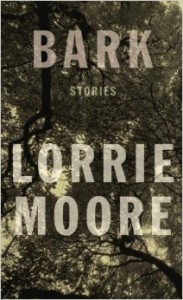This review is by contributor Thuy Dinh, editor of Da Mau Magazine.
 Lorrie Moore’s Bark is more like a dachshund’s whimper. An elegy to fifty-something baby boomers, this collection of short stories is listless despite the high-concept packaging: the notion of stories as “songs” in a music album, with each song articulating a mood related to the album’s title.
Lorrie Moore’s Bark is more like a dachshund’s whimper. An elegy to fifty-something baby boomers, this collection of short stories is listless despite the high-concept packaging: the notion of stories as “songs” in a music album, with each song articulating a mood related to the album’s title.
Meaning the outer layer of trees, hardened by time and weather, bark is an apt and tactile metaphor for middle age. It also suggests a dog’s, or an insecure person’s, scare tactic: His bark is worse than his bite. Thus debarking (the title of one story in this collection) can mean “to peel, leave a ship, unload, denude, reveal.” Yet the epiphanies in Moore’s stories are cold comforts; they merely ease her characters into disunion or death.
“Foes” and “Subject to Search” are the two most successful stories out of the eight featured. They both take place in supposedly convivial settings, when the main characters are sharing meals with each other. But no communion takes place in either story. Instead, doubt, enmity, and loneliness predominate.
Bake, the liberal protagonist in “Foes,” is mortified when realizing that his dining companion and “foe,” a Republican lobbyist named Linda, is not a fetching Asian-American but a 9/11 burn victim whose “exotic looks” at close range turn out to be the results of botched reconstructive surgery.
“Subject to Search” deftly illustrates the horror of glibness disguised as romance. The juxtaposition of the heroine’s spy lover making global decisions via a remote-access laptop with a pointed yet oblique reference to Abu Ghraib through an almost homonymic line from Jabberwocky—“the mome raths outgrabe”—reinforces the cartoonish sterility of both modern love and war.
While depressed middle-aged characters should not necessarily diminish Moore’s stories, they are unsympathetic due to their First World problems. Many characters protest the war in Iraq and imagine vivid acts of violence against their spurious government or faithless spouses, but generally do nothing. They seem to be intrigued or attracted to people of different races or cultures but make no attempt to understand these others. The despair seems hollow, theatrical. It’s hard to care for aging characters who use the Bush administration’s war on terrorism as an excuse to wallow in self-pity.
Most of the stories’ insights are deeply arresting, but they resemble literary criticism more than fiction. The stories are technically solid, but seem mannered, hermetic, like assignments in an MFA writing workshop. Lacking life-like characters and rich, textured settings, Bark is marooned by lethargy, or perhaps unmoored by inside jokes and cannot debark.






2 Comments
Lauren
February 26, 2014 at 7:39 amI really appreciate this review, because it digs deep and explains the issues the reviewer had with the stories. There has been so much buzz about this book, but I’ve not yet read anything that gives me a feel for it. And while Thuy had her issues with it, her review almost makes me more likely to read it (I had very little interest before) because I want to see if I see what she saw and feel what she felt, or if I connect with the work differently. Thanks to Thuy for her thoughtful review.
Jann
February 26, 2014 at 8:33 amPass.